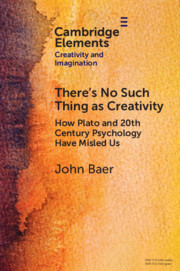2 results
Chapter 4 - Domain Specificity
-
- Book:
- Cognitive Ontology
- Published online:
- 15 January 2023
- Print publication:
- 05 January 2023, pp 100-122
-
- Chapter
- Export citation

There's No Such Thing as Creativity
- How Plato and 20th Century Psychology Have Misled Us
-
- Published online:
- 10 June 2022
- Print publication:
- 07 July 2022
-
- Element
- Export citation

